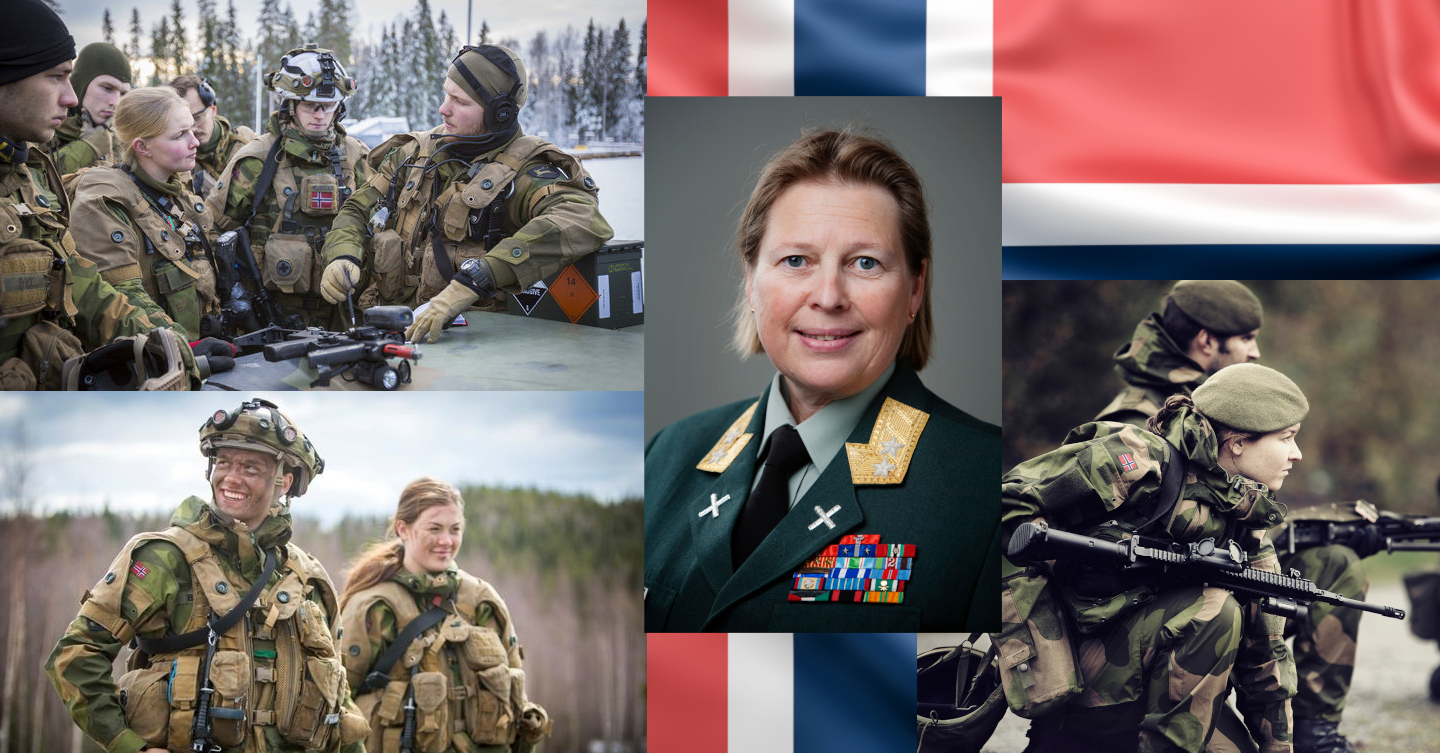
On 31 October 2000, the UN Security Council adopted Resolution 1325 affirming the “important role of women in the prevention and resolution of conflicts and in peacebuilding.” Here at WAR ROOM we have addressed the importance of Women in Peace and Security time and again and this episode visits the topic once more. Today on A BETTER PEACE we welcome a woman who has championed the values set forth by the resolution. Over a forty year period, Major General, retired, Kristin Lund, was the first woman to be promoted to the rank of major general in the Norwegian Army, the first woman to command a United Nations peacekeeping operation and the first woman to be inducted into the U.S. Army War College International Fellows Hall of Fame. She joins our podcast editor Ron Granieri in person in the studio to discuss her experiences in the joint/multinational force conducting peacekeeping operations around the world throughout the years.
We put gender on top of the agenda and that increased the number of female military personnel from 4% to 8%, and for the UN police from 10% to 25% just by putting it from the bottom of the agenda, as it very often is, to the top. It has to be anchored at the top node of the organization.
Podcast: Download
Kristin Lund is a retired Major General in the Norwegian Army. During her distinguished military career she was appointed deputy commander of the Norwegian Army Forces Command and was the first female officer to be promoted to the rank of major general and was subsequently appointed as chief of staff of the Norwegian Home Guard. She was also the first woman to command a United Nations peacekeeping operation, serving as Force Commander for the United Nations Peacekeeping Force in Cyprus from 2014 to 2016 and later as Head of Mission/Chief of Staff of the United Nations Truce Supervision Organization from 2017 to 2019. She is a graduate of the AY07 Resident course at the U.S. Army War College and the first woman inducted into the War College International Fellows Hall of Fame.
Ron Granieri is an Associate Professor of History at the U.S. Army War College and the Editor of A BETTER PEACE.
The views expressed in this presentation are those of the speakers and do not necessarily reflect those of the U.S. Army War College, U.S. Army, or Department of Defense.
Photo Credit: Photos courtesy of the Norwegian Armed Forces, Flag Background photo created by www.slon.pics – www.freepik.com





One way to look at such things as “diversity,” this may be from the perspective of “looking like the change that you desire in others.” Thus if:
a. Our goal is to “change the world” (example: see the UN’s Millennium Development Goals) — this, so that the states and societies of the world might made to better interact with, better provide for and better benefit from such things as capitalism, globalization and the global economy:
“13. All these proposals are set in the context of globalization, which is transforming the world as we enter the twenty-first century. In this new era, people’s actions constantly – if often unwittingly – affect the lives of others living far away. Globalization offers great opportunities, but at present its benefits are very unevenly distributed while its costs are borne by all.
14. Thus the central challenge we face today is to ensure that globalization becomes a positive force for all the world’s people, instead of leaving billions of them behind in squalor. Inclusive globalization must be built on the great enabling force of the market, but market forces alone will not achieve it. It requires a broader effort to create a shared future, based upon our common humanity in all its diversity.”
(As to numbers 13 and 14 above, see “We the Peoples: The Role of the UN in the 21st Century,” United Nations Millennium Report, by then-Secretary-General of the United Nations Kofi A. Annan.)
Then:
b. We, ourselves, will need to start looking more like the change that we desire in others — for example — as relates to such things as racial, ethnic, sexual, gender, etc., equality and diversity?
The potential problem with this line of thinking, however, is that it appears to have absolutely nothing to do with “peace” or “peacebuilding;” this, given that such an attack on the exceptionally non-equal and non-diverse status quo — in both the Global North and in the Global South — this is guaranteed to produce not peace but, rather, conflict, and on a global scale? (Such as we are witnessing today, in both the Global North and in the Global South?)
Bottom Line Thought — Based on the Above:
Thus, time to stop relating our “diversity” efforts to such things as “peacebuilding” today and, instead, start relating them to such things as “transformation” and “modernization,” to wit: processes which readily admit to, and accept, that “conflict” — not “peace” — will be the order of the day?
“The apparent relationship between poverty and backwardness, on the one hand, and instability and violence, on the other, is a spurious one. It is not the absence of modernity but the efforts to achieve it which produce political disorder. If poor countries appear to be unstable, it is not because they are poor, but because they are trying to become rich. A purely traditional society would be ignorant, poor, and stable.”
(See Samuel P. Huntington’s famous 1968 “Political Order in Changing Societies,” at Page 41.)
It is far past time that we come to see such things as “peacebuilding,” “peacekeeping,” etc., today; this, more in terms of an acknowledgement by entities such as the U.S./the West and the U.N. that:
a. Their common and coordinated world-changing and market-based “development” and “diversity” goals and initiatives (see my initial comment above), these
b. Require military forces — to deal with the (sometimes coordinated and common?) “resistance to change” forces and conflicts arising from their (the U.S./the West and the U.N.’s) pursuit of such “development” and “diversity” goals and initiatives.
Here, for example, appears to be a discussion by the U.S. Military (a) as to this exact such understanding (b) as relates to non-U.S./Western countries:
“a. An IDAD (Internal Defense and Development) program integrates security force and civilian actions into a coherent, comprehensive effort. Security force actions provide a level of internal security that permits and supports growth through balanced development. This development requires change to meet the needs of vulnerable groups of people. This change may, in turn, promote unrest in the society. The strategy, therefore, includes measures to maintain conditions under which orderly development can take place.” (Item in parenthesis above is mine.)
(See our very own Joint Publication 3-22, “Foreign Internal Defense,” dated 17 August 2018, in Chapter II, “Internal Defense and Development,” Paragraph 2, “Construct.”)
What the U.S./the West and the U.N. appear not to have anticipated, however, this is that these such “resistance to change” forces and efforts would come to include — not only elements from the Global South (for example, conservative groups in the Islamic world) — but also elements from the Global North (for example, conservative groups in the U.S./the West).
Bottom Line Thought — Based on the Above:
Given the information that I have provided above, will the U.S/the West and the U.N. now:
a. Continue on with their world-changing and market-based “development” and “diversity” goals and initiatives? (Given that “resistance to change” forces have now have appeared in the Global North, this would appear to require that a “Domestic Internal Defense” force — rationalized as per and modeled on the “Foreign Internal Defense” force above — be developed and deployed to the U.S./the West also?) Or:
a. Will they (the U.S./the West and the U.N.) scale back and/or abandon their such goals and initiatives — both at home and abroad?
Using Sir Adam Robert’s “Transformative Military Occupations: Applying the Laws of War and Human Rights” as a guide, let us look at how the idea of “peacebuilding” (and thus the idea of “ANCHORED AT THE TOP: WOMEN IN PEACE AND SECURITY?) may have changed over time:
From the first two paragraphs of the above-referenced Sir Adam Roberts paper:
“Within the existing framework of international law, is it legitimate for an occupying power, in the name of creating the conditions for a more democratic and peaceful state, to introduce fundamental changes in the constitutional, social, economic, and legal order within an occupied territory? …
These questions have arisen in various conflicts and occupations since 1945 — including the tragic situation in Iraq since the United States–led invasion of March–April 2003. They have arisen because of the cautious, even restrictive assumption in the laws of war (also called international humanitarian law or, traditionally, jus in bello) that occupying powers should respect the existing laws and economic arrangements within the occupied territory, and should therefore, by implication, make as few changes as possible.”
From the first two paragraphs of Section IV – Conclusion: The Relevance of the Wars of War and Human Rights — from the above-referenced Sir Adam Roberts paper:
“The idea of achieving the transformation of a society through a military intervention is far from new.
It was a key element in much European colonialism and in France’s wars after the Revolution of 1798. The United States, with its long-held vision of itself as a reformer of a corrupt international system, has been particularly attracted by the idea, but has devoted surprisingly little attention to either to the checkered history of transformative interventions or to the prescriptive question of how they should be conducted.
The need for foreign military presences with transformative political purposes is not going to disappear. The U.S. government belatedly recognized this circumstance (and implicitly recognized that mistakes had been made in Iraq) in 2004-2005, when it established the Office of the Coordinator for Reconstruction and Stabilization. Based in the State Department, the office was charged with leading U.S. government civilian capacity ‘to prevent or prepare for post-conflict situations, and to help stabilize and reconstruct societies in transition from conflict or civil strife, so they can reach a sustainable path toward peace, democracy and a market economy.’ Similarly, in December 2005, the United Nations established a Peacebuilding Commission, an advisory body to assist in post-conflict peacebuilding and recovery.”
Thus, today, to read such things “peacebuilding” and “ANCHORED AT THE TOP: WOMEN IN PEACE AND SECURITY;” these, more from the “transformative” “path toward peace, democracy and a market economy” point of viewed offered above — and, thus, less from the “make as few changes as possible” point of view of earlier “peacebuilding” idea?